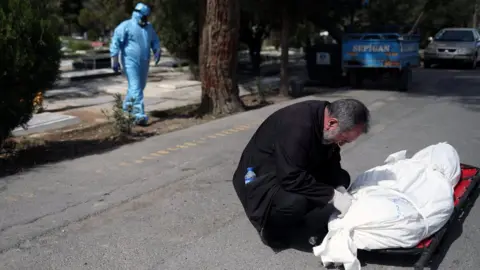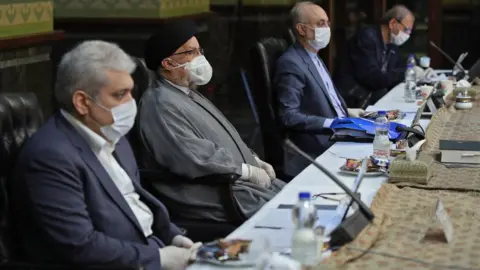Coronavirus: Iran bans internal travel to avert 'second wave'
 Reuters
ReutersIran's government has banned internal travel and warned of a "second wave" of its coronavirus disease outbreak, as the official death toll passed 2,000.
Spokesman Ali Rabiei lamented that some people had ignored advice and travelled during the Nowruz new year holidays.
As a result, he said, people would no longer be able to leave their cities and would soon face other restrictions.
Iran's leaders have so far resisted imposing lockdowns despite it being one of the world's worst-hit countries.
They have insisted that all necessary measures to stop the spread of Covid-19 have been taken, despite many Iranians expressing concern.
On Wednesday, health ministry spokesman Kianoush Jahanpour reported 143 new deaths in the past 24 hours, bringing the death toll to 2,077 since mid-February.
He said the number of confirmed cases had risen by 2,206 to 27,017, although the actual number is believed to be far higher.
Last week, the health ministry had called on Iranians to stay at home during Nowruz instead of visiting their families or going on day trips.
"Unfortunately some Iranians have ignored advice from health ministry officials and travelled during the new year holidays," Mr Rabiei told a televised briefing. "This could cause a second wave of the coronavirus."
He added that security forces would now stop people from travelling between cities and that new regulations were coming soon to help contain the spread of Covid-19.
"We shall tighten our regulations if people do not obey new regulations," he warned.
 AFP
AFPAt a cabinet meeting, President Hassan Rouhani said the regulations would be "strict" and would "create difficulties" for Iranians.
He added that the government might have no choice but to close parks for the nature festival of Sizdah Bedar on 1 April, when Iranians traditionally have picnics.
"People have to realise that these are difficult decisions that are being taken to protect people's lives," he explained. "But we have no choice, because the lives of Iranians are important to us."
In other developments in the Middle East on Wednesday:
- The first Palestinian died as a result of Covid-19. The woman in her 60s was a resident of Bidu, north of Jerusalem, the Palestinian Authority said. Sixty-two cases have been reported in the occupied West Bank and two in Gaza
- In Israel, where five people have died and another 2,030 have been infected, the government approved new restrictions. People will be required to stay within 100m (330ft) of their homes; prayer will only be allowed in open spaces; and public transport will be reduced to a quarter of its usual capacity
- Coronavirus testing started in opposition-held north-western Syria after the World Health Organization delivered 300 kits. The government meanwhile imposed a 12-hour overnight curfew in areas under its control and closed all borders, a day after it confirmed the first case in the war-torn country
- Saudi Arabia reported its second death and tightened a 21-day nationwide curfew that started on Monday. People will now be stopped from entering or leaving the capital Riyadh and the Muslim holy cities of Mecca and Medina
- In Jordan, where 153 cases have been reported, the government eased an indefinite curfew that had prevented people from leaving their homes under any circumstances. They will now be able to go out on foot to local grocery shops
- In Egypt, a two-week partial curfew keeping people off the streets between 19:00 and 06:00 took effect. There was also an extension of school closures until mid-April. The country has reported 402 cases of Covid-19 and 20 deaths
